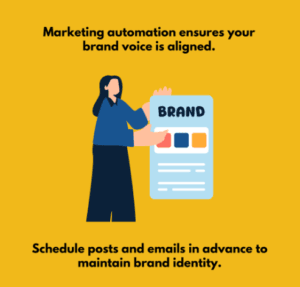Imagine reaching thousands of potential customers with the click of a button. 50% of work can now be automated in today’s age. Marketing automation is a new way to simplify and optimize marketing efforts. With the emergence of marketing automation tools and platforms, businesses of all sizes can now automate repetitive tasks, enhance personalization, and drive better results. From increased efficiency to lead generation, marketing campaign automation brings out a list of benefits that transform the way you do business.
1. Increased Efficiency and Time Savings
Marketing automation streamlines common tasks, such as emails, social media posts, or data entry, freeing precious time for marketing teams to focus on high-value activities. Besides, it makes it unlikely to have human mistakes. In a Zapier study, 2 out of 3 knowledge workers say automation has helped them be more productive at work.
Automation enables marketers to schedule and manage campaigns over several channels with great efficiency. Marketers don’t need hours drafting emails, posting social media messages, and checking the responses, which they can accomplish through their marketing team with the establishment of an automated workflow.
Automation can also play a role in communication. Businesses want to streamline communication workflows, ensure that messages are sent to the appropriate departments, and reduce manual effort. Role-based email address detection services help businesses determine the type of recipient for automated communications, allowing for targeted messaging and more efficient handling of inquiries. This increases efficiency by minimizing response times and improving the accuracy of follow-up actions.
2. Improve Lead Generation and Scoring
Automated systems can capture and score leads based on their behavior, preferences, and engagement levels. This way, businesses can nurture leads through the marketing funnel more effectively. Analyzing customer data and engagement patterns, marketing automation tools can identify the most promising leads and prioritize them for targeted follow-up. This way, marketing efforts are directed towards high-potential prospects, increasing the chances of conversion. But that is not all; segmentation of leads into various classes increases the chances of personalized communications to enhance conversion rates.
3. Deepened Personalization
Marketing automation helps deliver personal communications at an excellent scale through segmentation of the target audience based on demographics, behavior, and preference for creating targeted emails, offers, and content. This is sure to give a deep sense of personal connection with the customer, greatly enhancing engagement and loyalty. Whether it is a birthday discount, a personalized product recommendation, or an invitation to some exclusive event, automation makes it easy to tailor the message that speaks directly to every customer’s interest and needs. Such targeted marketing will most likely increase the chances of repeated business with the audience.
4. Better Customer Segmentation
It gives the automation tools that successfully support a business in customer segmentation based on their previous interaction and behavior. This type of segmentation helps businesses send more targeted messages to customers, improving engagement rates. Businesses understand, in a detailed way, each segment of their customers about the specific preferences and behaviors they exhibit. This is an approach that not only drives engagement but also retention and conversion of customers into brand advocates.
5. Consistent Branding and Messaging
Marketing automation guarantees your brand voice and messaging are aligned across all channels, be it social media or email marketing. A consistent brand voice is necessary for trust and credibility with your audience. Marketing automation tools enable a company to schedule posts and emails in advance, thus making sure that all communications align with the tone, messaging, and visual style of the brand. This consistency helps to create brand identity while keeping customers engaged with a brand across multiple touchpoints.

6. Better ROI Measurement and Analysis
Marketing automation provides detailed analytics that will enable businesses to track such key performance metrics as open rates, click-through rates, and conversions. This data-driven approach will allow marketers to refine their strategies and utilize resources more effectively. This is because a business can know what works and what does not and optimize the marketing campaigns for better results. With marketing automation, it’s easy to measure the return on investment of the marketing efforts and make data-backed decisions to enhance performance.
7. Lowered Marketing Costs
Automation of mundane work reduces the manual effort and frees up the budget to be spent on other activities that will bring about more results. Marketing automation can cut marketing costs, according to McKinsey & Company. The amount of money saved on marketing can be reinvested in areas such as content and customer engagement, which are of more importance. This way, marketing automation eliminates repetitive work, allowing a company to control its budget more effectively and making the efficiency of its overall marketing spending much better.
8. Faster Customer Response Times
Marketing automation makes it possible for a business to answer customer questions quickly through e-mail, social media, or any other media. Speed matters in the fast-paced world of the digital age. Automated systems can promptly respond to basic questions, freeing up your team to take care of more complex customer service requests. Quick responses help to form better relationships with customers and increase satisfaction levels. Businesses advance their customer service by automating responses and taking care of routine tasks so that they are timely in responding to the needs of their customers.
9. Scalability
Marketing automation is scalable with the growth of your business. Automation can handle higher volumes of tasks independently as your business grows, without compromising marketing quality. This is, hence, scalable. All are being built to grow your business and to handle much greater amounts of data, such as more complex workflows, and larger and sometimes spread out customer base in just one more set of hands. This allows businesses to scale their marketing efforts effectively as they grow.
10. Improved Team Collaboration
Marketing automation encourages better collaboration between departments such as marketing, sales, and customer service. Automated workflows help align team objectives and streamline communication. By breaking down silos and facilitating teamwork, marketing automation ensures that everyone in the organization is working towards the same goals. When teams work together seamlessly, a more cohesive customer experience and lead nurturing can be provided while creating sales. This would actually help businesses operate more effectively for the customers’ demands in the market.
Conclusion
Automating your marketing campaign has numerous benefits to boost your business. From saving time and improving efficiency to delivering personalized experiences and driving better ROI, marketing automation is no longer just a trend—it’s a necessity for staying competitive in today’s market. By leveraging marketing automation tools, businesses can streamline their processes, enhance customer engagement, and ultimately achieve better results. If you’re looking to take your marketing efforts to the next level, investing in automation should be a top priority.
FAQs
How can marketing automation be used to personalize communications without compromising quality?
Marketing automation enables companies to send relevant messages based on customer data. It will ensure that the communication is personalized but not too much for the recipient. It is possible to maintain a high level of quality and relevance in customer interactions through effective audience segmentation.
What are the challenges that businesses face when scaling marketing automation efforts?
The biggest challenges include managing a large volume of data and ensuring that the brand voice is consistent across multiple channels. However, investing in scalable automation tools and continuous optimization can help overcome these hurdles.
How does marketing automation affect collaboration between marketing, sales, and customer service teams?
Marketing automation has a positive influence on collaboration between the marketing, sales, and customer service teams because it ensures streamlined workflows, and alignment of goals, and ensures that both teams work toward the achievement of a common objective. This helps in better communication and enhances the overall experience for the customer.

















